After a solid two years of incessant propaganda from the legacy media and Public Health™ authorities, we haven’t heard much about bird flu lately.
However, as the United Nations Food and Agriculture Organization (FAO) convenes an international summit to strategize on mitigation efforts, bird flu terror might be back with a vengeance.
Via Reuters (emphasis added):
The United Nations' Food and Agriculture Organization (FAO) has chosen Brazil, which in May reported its first outbreak of bird flu on a chicken breeder farm, to host next week's global event on prevention and control of the disease.
Bird flu has spread around the globe and led to hundreds of millions of poultry being culled. It has also been reported in dairy cows, cats, and humans…
Mitigating the devastating impacts of the bird flu, which triggered trade bans against Brazil and other poultry producers, requires an integrated response supported by constant investments from both the public and private sectors, according to FAO.
"No country or sector can face this crisis alone," the agency said in a statement…
Meza confirmed raising cage-free or free-range chickens carries a greater risk, as flocks could be more exposed to contact with infected wildlife.
To reduce risk, mapping out all chicken farms, big and small, is crucial, according to FAO's Andres Gonzalez, an expert in sustainable livestock.
How convenient that the biggest alleged bird flu threat comes from free-range chickens — i.e., non-factory-farmed chickens, mostly raised by small-scale, independent farmers.
Related: ‘Lab-Grown’ Meat Increases Blood Pressure, Inflammation, Depression: Study
In March of this year, the FAO “reaffirmed its commitment to global monitoring, data sharing and technical guidance” regarding bird flu suppression, parroting language eerily similar to the WHO’s Global Pandemic Treaty successfully foisted on the world in April without the United States as a signatory.
Via United Nations, March 17, 2025 (emphasis added):
[UN Food and Agriculture Organization] (FAO)] reaffirmed its commitment to global monitoring, data sharing and technical guidance to help countries contain the virus.
[FAO Deputy Director-General] Ms. Bechdol also stressed the importance of private sector engagement, particularly in developing vaccines, diagnostics and high-quality animal health services.
The briefing also included a third call for funding proposals under the Pandemic Fund, hosted by the World Bank.
Over the past two years, FAO has co-led dozens of Pandemic Fund projects aimed at strengthening disease surveillance, early warning systems and health infrastructure to prevent future outbreaks.
Corporate state media has been promulgating the “giant ag good, independent ag bad” mantra for years at this point.
Via The New York Times, December 2024 (emphasis added):
Agriculture in general does have real environmental downsides. It’s the leading driver of water pollution and shortages, deforestation and biodiversity loss. It generates one-fourth of the greenhouse gases that heat up the planet.
And it’s eating the earth. It has already overrun about two of every five acres of land on the planet, and farmers are on track to clear an additional dozen Californias worth of forest by 2050. That would be a disaster for nature and the climate, because the carbon dioxide released by converting wild landscapes into farms and pastures is already the most damaging source of agricultural emissions, worse than methane from cow burps or nitrous oxide from fertilizer.
But industrial agriculture in particular has one real upside: It produces enormous amounts of food on relatively modest amounts of land. And that will be agriculture’s most vital job in the coming decades. The world will need even more enormous amounts of food by 2050, about 50 percent more calories to adequately feed nearly 10 billion people. The inconvenient truth is that factory farms are the best hope for producing the food we will need without obliterating what’s left of our natural treasures and vaporizing their carbon into the atmosphere…
Old MacDonald-style farms where soil is nurtured with love and animals have names rather than numbers may sound environmentally friendly. But their artisanal grains and grass-fed beef are worse for nature than chemical-drenched corn and feedlot-fattened beef because they require much more land for each calorie they produce.
Related: UK Mandates Backyard Chicken Registration To Fight Bird Flu
What they’re doing here, in my view, is sowing the seeds for the eventual shutdown of all non-government-sanctioned farming so as to further consolidate control of the food supply in the hands of a tiny group of elite producers.
Once the Chinese-style digital credit score becomes the norm across the West and the wider world, food — the most essential of all commodities along with water — will be rationed as a reward for compliance, as defined by whatever technocrat or, more likely, some AI algorithm.
Related: Chinese Communist Party Literally Names Its Domestic Surveillance Program 'Skynet'
If all of that sounds conspiratorial, I grant that. I might be wrong; maybe the United Nations loves the good people of Earth and has the sole intention to keep them safe from bird flu with its “global event on prevention and control of the disease.”
But if the last five years have taught us anything, it’s that no totalitarian machinations are beyond the psychopaths who run the governments of every Western nation and the transnational governing bodies that increasingly subvert their sovereignty.










